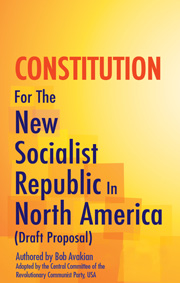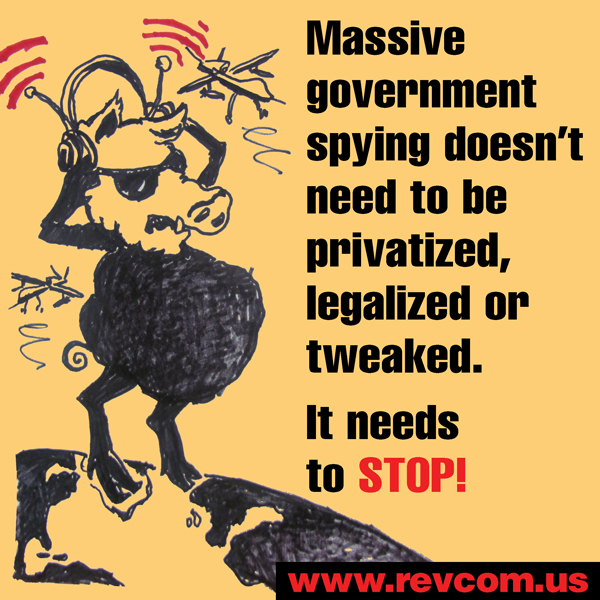The “USA Freedom Act”: Freedom to Spy and Suppress
June 8, 2015 | Revolution Newspaper | revcom.us
On June 2, the U.S. Senate voted overwhelmingly to extend key elements of the USA Patriot Act through 2018. Passed in the immediate aftermath of the 9/11 attacks, the Patriot Act, and its interpretation by courts and application by government agencies, has set loose almost unlimited secret government spying on everything people do. This kind of secret spying on American citizens has been used to facilitate illegal assassination of U.S. citizens abroad without trial, by presidential decree. And it is used to monitor the most minute, personal, and especially oppositional activity, communication, and thinking of nearly everyone on the planet who has access to a phone or the Internet.
But what made headlines was not the extension of the Patriot Act. Nor did the extension of the Patriot Act occasion any serious examination of the nature of U.S. spying, why the rulers of the United States find it necessary to maintain such intense surveillance of everyone in the world, and what that says about the nature of their rule.
Instead, the terms of public debate have been framed by the ruling class media around the extension of, or changes to, one particularly notorious section of the Act—Section 215. Section 215 has been used by the government to justify the massive collection of “metadata,” which tracks everyone you call or connect with online, and identifies patterns of communication and linkages between who communicates with whom, of the activities and communication of billions of people, including hundreds of millions within the U.S.
The Orwellian-named USA Freedom Act essentially transfers the job of maintaining this obscenely intrusive database from the National Security Agency to private phone companies. The phone companies—like AT&T or Verizon—are required to store this data and to turn it over to the government when ordered to by a special, secret court that is infamous for rubber-stamping every surveillance request from the government.
On May 7 a federal appeals panel in New York ruled that the government’s vast, massive collection of phone and Internet metadata was not authorized by the (at the time) existing provisions of Section 215 of the Patriot Act. The court didn’t conclude that this spying was a violation of the U.S. Constitution—just that it needed to be approved by Congress. Now, with some tweaks, that has taken place.
That is not any kind of “step forward” in restoring civil liberties!
Legitimacy and Dictatorship
 The Constitution for the New Socialist Republic in North America (Draft Proposal) from the RCP is written with the future in mind. It is intended to set forth a basic model, and fundamental principles and guidelines, for the nature and functioning of a vastly different society and government than now exists: the New Socialist Republic in North America, a socialist state which would embody, institutionalize and promote radically different relations and values among people; a socialist state whose final and fundamental aim would be to achieve, together with the revolutionary struggle throughout the world, the emancipation of humanity as a whole and the opening of a whole new epoch in human history–communism–with the final abolition of all exploitative and oppressive relations among human beings and the destructive antagonistic conflicts to which these relations give rise.
The Constitution for the New Socialist Republic in North America (Draft Proposal) from the RCP is written with the future in mind. It is intended to set forth a basic model, and fundamental principles and guidelines, for the nature and functioning of a vastly different society and government than now exists: the New Socialist Republic in North America, a socialist state which would embody, institutionalize and promote radically different relations and values among people; a socialist state whose final and fundamental aim would be to achieve, together with the revolutionary struggle throughout the world, the emancipation of humanity as a whole and the opening of a whole new epoch in human history–communism–with the final abolition of all exploitative and oppressive relations among human beings and the destructive antagonistic conflicts to which these relations give rise.
Read the entire Constitution for the New Socialist Republic in North America (Draft Proposal) from the RCP at revcom.us/rcp.
The USA Freedom Act was opposed—at least to some degree—by forces in the ruling class who want to maintain tighter government control over this data, and, seemingly from a different direction, by a significant minority in Congress, who argued that more changes were needed.
What’s behind these differences, and what do they amount to? Let’s break that down:
When the courageous actions of Edward Snowden and journalists like Glenn Greenwald, Laura Poitress, and others exposed the massive nature of U.S. government spying, their revelations struck a nerve throughout society. It has been what is called a “legitimizing norm,” that is, something that people broadly accept or see as giving the system credibility and validity—that if you mind your own business and don’t make waves in the United States, or if you grumble a bit on Facebook, or in a text message, the government is not going to be monitoring everything you do, keeping records of it, and using that data to come after you.
This would not be a good or morally acceptable bargain, even if it were true!
A tweet circulating in various forms attributed to Edward Snowden makes a point that saying you’re not worried about the government spying on you because you’re not doing anything wrong is like saying you’re not worried about free speech because you don’t have anything to say.
Nobody should put up with the crimes of this system—from the epidemic of police murder to the war on women to the wanton profit-driven destruction of the environment, to torture and wars of aggression around the world.
But it is still the case that as a societal phenomenon, the Snowden revelations revealed to millions and millions of people in this country that no such “deal” exists. That everything everyone did was under surveillance.
Ongoing revelations of the nature of U.S. government spying, including things like secretly collecting lists of what books people read and anything else they do at the library, and making it illegal for libraries to expose that, criminalization of thought, six-degrees-of-separation connections leading to terrorism prosecutions... even tapping the personal phone of the chancellor of Germany, a close U.S. ally, have had a cumulative effect of undercutting rationalizations that all this spying is about “protecting American lives.” And the extent of unrestrained U.S. spying created tensions with allies and discredited the U.S. empire branding itself as the model of “freedom and democracy” around the world.
In the face of this, some, including influential forces―let’s call them what they are, fascists in the ruling class—insist that any concession, or any appearance of concession that the government has gone too far in spying on people, opens the door to further questioning and de-legitimization of the whole setup. They insist that even conceding that there are civil liberties issues at stake in government spying is essentially aiding “the terrorists.” The Wall Street Journal, for example, declared that the USA Freedom Act was “NSA Reform That Only ISIS Could Love.”
Others in the ruling class―with Rand Paul emerging as a spokesman for this view—insisted that there needed to be some formal restraints on the scope of government spying. Essentially their view is that some form of formal recognition of a right to privacy for (at least some sections of) people is a necessary component of cohering U.S. society, and they fear that unrestrained, massive government spying outweighs the good it does from the perspective of preserving and maintaining this system. It is in that context that Republican Congressman Justin Amash (an ally of Rand Paul) said the new law “takes us a step in the wrong direction by specifically authorizing such collection in violation of the Fourth Amendment to the Constitution.”
What finally emerged in the USA Freedom Act was outsourcing the storage of the records of everyone’s phone calls from the government to phone companies, and the codification and enshrinement of that level of spying.
The Real Situation
Here’s the real situation: Those who rule this country create all kinds of enemies around the world and within their borders. They justify their massive spying apparatus as aimed at “terrorists,” but the scope and nature of that setup makes it clear to anyone who looks at it with open eyes that it is about spying on everyone and suppressing every kind of opposition to its epidemic of police murder, its wars for empire, its oppression of women, its environmental destruction, its persecution of immigrants, and suppressing legitimate revolutionary struggle.
Massive government spying is not the result of a security apparatus out of control. It is not the product of a “national security state” detached from the essence of this system, as some critics—including some who have done invaluable exposure—argue. This massive government spying is inherent in ruling over a world of injustice, exploitation, and oppression, and contending with rival powers to do that.
Massive government spying doesn’t need to be privatized. It doesn’t need to be legalized. It doesn’t need to be tweaked. It needs to STOP!
Volunteers Needed... for revcom.us and Revolution
If you like this article, subscribe, donate to and sustain Revolution newspaper.





